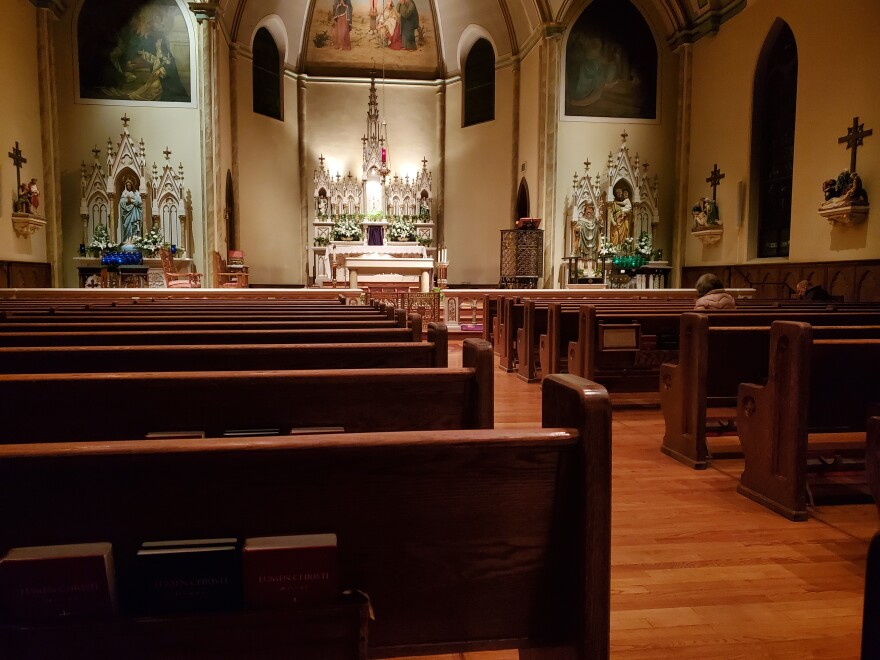A priest dressed in purple Lenten robes stands behind an altar and recites the opening prayer of the Catholic mass. “In the name of the Father, and of the Son, and of the Holy Spirit,” begins Father Daniel Dury.
A lone cameraman responds, “Amen.”
Parishioners of Columbus’ St. Catharine’s Catholic Church are at home, observing on a livestream. Some send videos and photos of themselves watching to Dury.
His parish is one of many offering its church service online as people adhere to government urgings to avoid mass gatherings. The Catholic Diocese of Columbus, which encompasses 23 Ohio counties, has stopped holding public masses through Easter in mid-April.
“That evening when I got word, I have to say I did cry,” Dury says. “I cried because I wasn’t able to offer mass and bring Christ to my people. And that’s my life. When you can’t do that, it’s really difficult.”
Other religious institutions and groups have also halted services for the next few weeks to help stop the spread of disease. With many people working from home or effectively laid off, religious leaders in Central Ohio say it’s more important than ever to provide spiritual comfort and guidance during the COVID-19 pandemic.
One Upside: More Time for Prayer
Faith leaders are quickly learning how to help their congregations deepen their spiritual lives without connecting in person.
“Practicing more of those yoga and meditation and all those kinds of things,” says Bhuwan Pyakurel, vice president of the Hindu temple Laxmi Narayan Madhir. “It’s been changing every day because we don’t know how long it’s gonna happen, and we never had it in the past.”
The Reynoldsburg temple cancelled two major events and shut down services until further notice. Pyakurel says people don’t normally get time to practice yoga to the extent that the faith recommends.
“We understand that with yoga, we can develop our immune systems better. Regular practice of meditation and yoga has been there for a very long time,” Pyakurel says. “In our faith system, how we sit, how we eat, is all part of the yogi tradition. Not only the physical exercise.”

Programs are also canceled at Noor Islamic Cultural Center, one of the largest and most ethnically diverse mosques in the state, which usually sees around 2,000 people at each Friday service. Interfaith and outreach director Imran Malik says the decision to cancel in-person prayer was tough because those gatherings are such a crucial tenet of the religion.
“The idea of congregation in Islam, just like in any faith community, is to bring the community together,” Malik says. “Bring the community together in times of strength, in times of weakness, in times of weakness and sadness as well.”
Malik says they’re raising up a group of volunteers to make sure no one gets left behind.
“We are putting some volunteer kind of task forces together to make sure those needs of the community are met,” Malik says. “And we are creating a helpline as well as some initiatives to do some food drives as well.”
A Retreat
Father Stephen Alcott at St. Patrick’s Catholic Church is also reflecting on how to fill in the gaps. He’s part of an order of friars who commit themselves to study, prayer and preaching.
“I’m realizing that a lot more of our ministry is probably gonna be over the phone than before for the time being,” Alcott says.
Alcott says the pandemic's timing peaks his curiosity.
“It just so happens that this whole outbreak is happening during Lent, a season of fasting, almsgiving and prayer,” Alcott says. “And so there’s a possibility for all of us, since we have a little more time perhaps, a little less opportunity to go out, to see this as a retreat. A retreat in the sense of taking time for prayer.”
Other large mainline churches like the Vineyard have also shifted services online. No matter the faith, local religious leaders hope their congregations will use this time of social distancing to better connect spiritually.
The Ohio Department of Health makes the following recommendations to protect yourself from illness:
- Wash hands often with soap and water for at least 20 seconds; dry hands with a clean towel or air dry hands.
- Use alcohol-based hand sanitizer when soap and water are unavailable.
- Cover your mouth with a tissue or sleeve when sneezing or coughing. Avoid touching your eyes, nose, or mouth with unwashed hands.
- Stay home when you are sick.
- Avoid contact with people who are sick.
Ohio's coronavirus call center is open to answer questions from 8 a.m. to 9 p.m. daily. The hotline number is 1-833-4-ASK-ODH or 1-833-427-5634. More information is available at coronavirus.ohio.gov.






